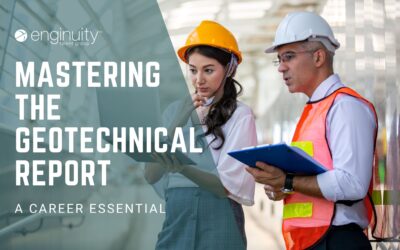In the ever-evolving field of geotechnical engineering, professionals often ponder whether to pursue a master’s degree or gain more practical experience to advance their careers. Both options offer unique advantages and can significantly impact career trajectories. Here, we explore the benefits of each path to help you make an informed decision.
The Value of a Master’s Degree
Pursuing a master’s degree in geotechnical engineering provides several key benefits. Advanced education offers deeper knowledge in specialized areas, such as soil mechanics, foundation engineering, and environmental geotechnics. This specialized knowledge can set you apart from your peers and open doors to more advanced roles within the field. Additionally, a master’s degree often includes opportunities for research, allowing you to contribute to innovative solutions and advancements in geotechnical engineering.
Academic qualifications can also enhance your professional credibility. Many employers and clients view a master’s degree as a testament to your commitment and expertise. This can lead to higher earning potential and greater job security. Furthermore, graduate programs often provide networking opportunities with professors, industry professionals, and fellow students, which can be invaluable for career growth.
The Benefits of Gaining Experience
On the other hand, practical experience is equally important in geotechnical engineering. Hands-on experience allows you to apply theoretical knowledge to real-world problems, enhancing your problem-solving skills and technical abilities. Working on diverse projects helps you build a robust portfolio and develop a deeper understanding of industry practices and challenges.
Experience also fosters professional growth through on-the-job learning and mentorship. Many skills, such as project management, client communication, and team leadership, are best developed through practical application. Additionally, gaining experience can lead to career advancement opportunities within your current organization, often faster than the time it would take to complete a master’s degree.
Balancing Education and Experience
For many geotechnical engineers, the ideal approach may involve balancing both advanced education and practical experience. Some professionals choose to gain a few years of work experience before pursuing a master’s degree. This approach allows them to bring practical insights into their academic studies, enriching their learning experience.
Alternatively, part-time or online master’s programs enable engineers to continue working while advancing their education. This offers the best of both worlds, allowing for immediate application of new knowledge to ongoing projects. Employers may also offer tuition reimbursement programs, making it financially feasible to pursue further education while maintaining full-time employment.
Navigating Your Career with Enginuity Advantage
Deciding between pursuing a master’s degree or gaining more experience depends on your career goals and personal circumstances. At Enginuity Advantage, we understand the complexities of career advancement in geotechnical engineering. Our expert guidance helps you navigate your career path, whether you’re considering further education or seeking new professional experiences. We connect talented engineers with leading employers, ensuring you have the resources and opportunities to achieve your career aspirations. Visit Enginuity Advantage to learn more about how we can support your professional journey.


0 Comments